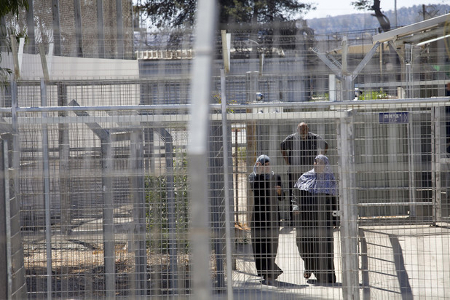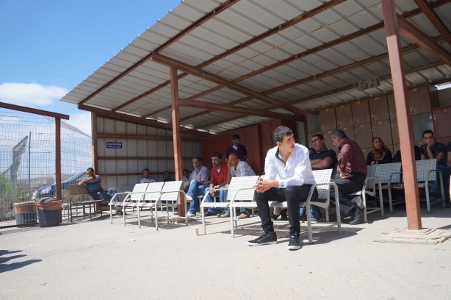"Military justice is to justice as military music is to music" Title of one of Robert Sherrill’s books

Palestinians entering military court (Oren Ziv/ActiveStills)
Led by curiosity, I went last Thursday to attend several trials at Ofer Military Court, next to the Ofer prison, both situated very close to Ramallah. Even if I knew that the trials would be in Hebrew and Arabic, I thought that it could be interesting to see the justice process and how the different actors of the trial behave and are treated. And I definitely was astonished by what I saw. Although I could not get the content of what was said, to observe the unfolding of a trial was already enough to understand and question the whole justice procedure in this court.
First of all, it is a real challenge to reach the actual court and observe a trial. The whole security process made me feel that I was visiting a prison rather than a court. The entrance of the complex is closed by a checkpoint. There I had to explain to the skeptical soldiers that I was not mistaking this checkpoint with the Qalandia one, that I was not lost but I actually wanted to watch the trial and that I had an Israeli authorization for it.
Once they overcome this first step, all the people wanting to attend a trial have to get registered a second time, and then to wait in an outdoor courtyard until their name is called by the soldiers. There is no precise time for the different trials, and the relatives of the Palestinian detainees have to wait an indefinite amount of time before they can enter into the courtrooms. The waiting seems unbearable for some families, who have come to hear the sentence for their child or their fathers. After long discussions with the soldiers, I finally entered an hour and a half after the beginning of the trials, although they had told me that they would call me five minutes after my registration. And some Palestinians families were still anxiously waiting outside after I got in.

Outdoor courtyard where the public has to wait before entering the courts (C. Loyer)
An “international” unfairly has special rights
After checking that the visitor did not bring anything other han a pen and a notebook, he can finally gain access to the courtrooms. But “courtrooms” is not a really adequate word to qualify the seven prefabricated buildings in which the sentences are decided. Next to one of the portable buildings, a Palestinian is waiting outside, because he has been refused the right to attend the trial. But as I am an “international”, I unfairly have the right to attend it. The size of the room is incredibly small: there are only ten seats for the audience at the back, and the detainees come four at a time, handcuffed in a small corner. All the members of the court are wearing the military uniform, and some of them are doing their military service. This collusion between military and judicial realms has been underlined by Addameer (the Prisoners Support and Human Rights Association): “Judges in the military courts are military officers in regular or reserve service. Most of the judges do not have long term judicial training, and many served previously as military prosecutors.”
Remembrances of Kafka and Ionesco
It was really hard to distinguish the beginning from the end of the trial, not only because of the barrier of the language, but also because of the total anarchy of the trial. The proceedings really reminded me of some of Kafka or Ionesco’s plays: the audience is contemplating the actors on stage, pretending to be judge or attorney, and acting absurdly, in a total chaos. Whereas one young Israeli soldier did the approximate translation of the Hebrew sentences of the judge, without even watching his interlocutors, drinking Coke and chewing gum at the same time, a lot of different people kept coming in and out the small building, which was very disturbing, in order to follow the trial. The Palestinian attorneys started to joke with the detainees, showing how non serious and ridiculous are those trials for the Palestinians, whereas the military clerk was sleeping on her chair. Two of the detainees were moved because they had been brought to the wrong courtroom.
“99.74 of the prisoners are convicted”
The role of the attorneys is also surprising. They do not really have time dedicated to their plea; they only can say a few words and bargain the sentence, more or less already decided, with the judge. The charges are very vague: some young men were accused of stone throwing, but it was not explained against whom or what the consequences were, and no proof were advanced to this statement. In this case, it is not surprising that Addameer has reported that “of those who are charged, approximately 99.74 percent are convicted1, and of these convictions, the vast majority is the result of plea bargains2.”
Moreover, the detainees are almost lucky when they receive their sentence, given that most of the trials I observed consisted in postponing the judgment to another day, without real reason. One young nineteen year old Palestinian saw his trial delayed by one week, because he has to take daily medicine for his Familial Mediterranean Fever every day. Another young detainee saw, after five minutes of trial, his judgment delayed three days later, without any reason provided. And his parents, who made the trip and waited three hours to know what would happen to him, just had time to shake his hand with a lot of emotion before the policeman took him back to jail. All those hindrances, delays, and weariness led to the fact that, at one point I was the only one left still observing the processing of four of the detainees.
“The law in these parts”
The question that kept running through my mind was: what kind of trial is that? How could the judgment be fair when a trial lasts five minutes, the detainees barely have the right to talk, the proceedings are continuously interrupted by people going in and out ? Even if military courts are established in exceptional moments, to deal with a period of conflict, can the security argument justify any violation of human rights? And even this security argument, at the core of the military rhetoric, was partly discredited in the documentary “The Law in These Parts”, directed in 2011 by Ra’anan Alexandrowicz, based on interviews with the judges who created the legal system to govern the occupied territories. But even if the military judges and prosecutors interviewed confess that legitimacy and democracy are not always what define the military trials, they also stress that the actors have to keep playing their role, to preserve order in Israel.
The show must absolutely go on, at all costs.
1 Addameer, Israeli Military Court report 2010
2 Ibid
